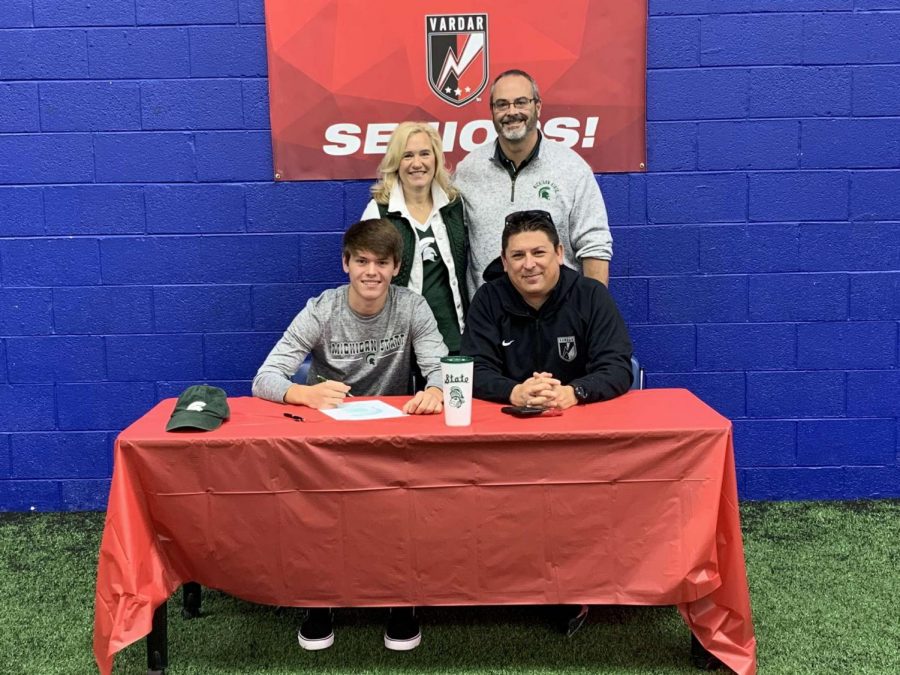College recruiting continues amid pandemic
January 20, 2021
Many athletes dream of having their athletic careers continued at the collegiate level, and a key component to achieving that dream is the recruiting process.
Yearly, prospective college athletes look forward to communicating with college coaches, and visiting possible landing spots. However, much like everything else this year, recruiting looks different.
“Covid affected my recruiting process a lot, because I wasn’t allowed to make any official visits to most of the universities I was interested in,” Rochester High School senior and Michigan State University soccer commit Zack Babiak said. “Most campuses shut down which meant I couldn’t get a good feel for the campus.”
Each college, and university handled the situation differently, however; some athletes did not take this into consideration when deciding on schools, because with schools in many different states, they all had certain guidelines to follow.
“Each state had different rules they had to follow, and it wasn’t up to the college,” Rochester High School senior and Elmhurst University basketball commit Jacqueline Hurst said. “Obviously I wanted to go see every college I was interested in, and do the normal tour things, but COVID changed that.”
A perk for many recruits is the ability to go to a game on the campus in order to get a feel for the atmosphere and culture of a college. This was not a possibility for most of this year’s recruits as colleges put limits on spectators at their games.
“The main thing I feel like I missed out on in the recruiting process was being able to go to a university or college and watch a basketball or football game on the sideline or courtside, and have the experience of the crowd and the environment,” Babiak said.
While the current situation has certainly made it harder for players to get a true feel for the school, college coaches have also been hindered, as they have had to change their recruiting strategies to rely less on in-person contact with prospective athletes.
“Getting to see kids live has been hard due to the state shutting down,” Rochester University head women’s basketball coach Brent Wichtner said. “I have relied heavily on film, and people I have garnered relationships with over the years opinions on kids they either coach or have seen play. Small schools don’t have budgets to travel out of state to recruit where the AAU tournaments were going on, so that hurt.”
While the pandemic is hopefully coming to an end in the near future, its effect on college recruiting will be around for years to come, as the NCAA, and NAIA have both allowed athletes an extra year of eligibility. This ruling will affect college teams roster sizes, and cause coaches to adjust the amount of players they are bringing in.
“I haven’t had to adjust for the 21’ recruiting class but it definitely will change the 22’ and 23′ classes as I won’t bring in nearly as many kids,” Wichtner said. “For the 21′ class I have only three seniors and all of them are graduating so I will need to bring in the same amount of kids as usual. A lot of my juniors that were set to be seniors next year will use the free year of eligibility and return as juniors next year and double major instead of graduating so it will mean I will only have two seniors versus seven if the year had counted.”
While the offer for an extra year of eligibility has been extended by the NCAA and NAIA, it will be up to the players on whether or not they accept it, and some are choosing to forgo their extra year.
“I have thought about an extra year of eligibility, and i’m not going to take it,” Alma College lacrosse player Brandon Bellant said.
Not all the changes to the recruiting process have been for the worse however; with all this extra time at home, coaches have had more chances to communicate with athletes over the phone.
“I feel we had more time than usual so it allowed for more phone calls and communication with recruits,” Wichtner said.
While the circumstances were certainly different this year, many athletes feel they made the right decision on college.
“I don’t know what would’ve been the outcome if COVID didn’t happen, but I’m really happy with the school I’m committed to, for academics and athletics, so I wouldn’t change that,” Hurst said.
It is definitely a setback for athletes not to be able to have their full recruiting process, however; many feel as though it is for the best as sports should take a backseat during this time and safety should come first.
“Although COVID took a lot from me sports wise, there are more important things than that,” Hurst said. “I’m lucky my family stayed healthy and safe.”



